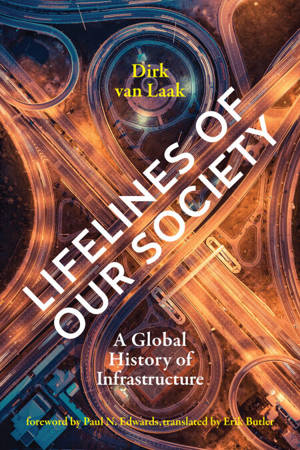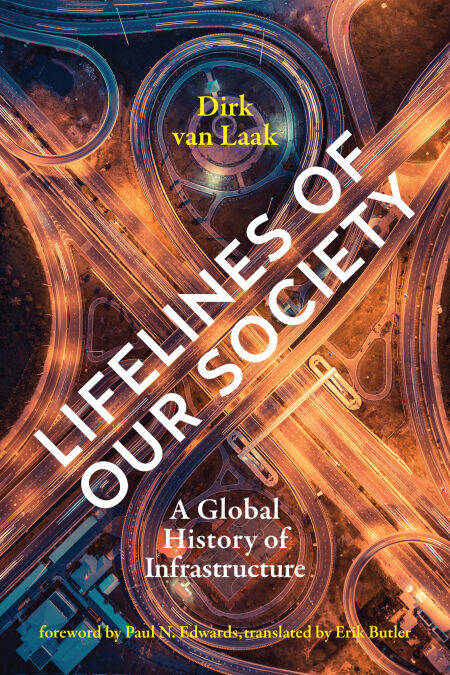
Bedankt voor het vertrouwen het afgelopen jaar! Om jou te bedanken bieden we GRATIS verzending (in België) aan op alles gedurende de hele maand januari.
- Afhalen na 1 uur in een winkel met voorraad
- In januari gratis thuislevering in België
- Ruim aanbod met 7 miljoen producten
Bedankt voor het vertrouwen het afgelopen jaar! Om jou te bedanken bieden we GRATIS verzending (in België) aan op alles gedurende de hele maand januari.
- Afhalen na 1 uur in een winkel met voorraad
- In januari gratis thuislevering in België
- Ruim aanbod met 7 miljoen producten
Zoeken
€ 34,49
+ 34 punten
Omschrijving
A comprehensive history and examination of global infrastructures and the outsized role they play in our lives.
Infrastructure is essential to defining how the public functions, yet there is little public knowledge regarding why and how it became today’s strongest global force over government and individual lives. Who should build and maintain infrastructures? How are they to be protected? And why are they all in such bad shape? In Lifelines of Our Society, Dirk van Laak offers broad audiences a history of global infrastructures—focused on Western societies, over the past two hundred years—that considers all their many paradoxes. He illustrates three aspects of infrastructure: their development, their influence on nation building and colonialism, and finally, how individuals internalize infrastructure and increasingly become not only its user but regulator.
Beginning with public works, infrastructure in the nineteenth century carried the hope that it would facilitate world peace. Van Laak shows how, instead, it transformed to promote consumerism’s individual freedoms and our notions of work, leisure, and fulfillment. Lifelines of Our Society reveals how today’s infrastructure is both a source and a reflection of concentrated power and economic growth, which takes the form of cities under permanent construction. Symbols of power, van Laak describes, come with vulnerability, and this book illustrates the dual nature of infrastructure’s potential to hold nostalgia and inspire fear, to ease movement and govern ideas, and to bring independence to the nuclear family and control governments of the Global South.
Infrastructure is essential to defining how the public functions, yet there is little public knowledge regarding why and how it became today’s strongest global force over government and individual lives. Who should build and maintain infrastructures? How are they to be protected? And why are they all in such bad shape? In Lifelines of Our Society, Dirk van Laak offers broad audiences a history of global infrastructures—focused on Western societies, over the past two hundred years—that considers all their many paradoxes. He illustrates three aspects of infrastructure: their development, their influence on nation building and colonialism, and finally, how individuals internalize infrastructure and increasingly become not only its user but regulator.
Beginning with public works, infrastructure in the nineteenth century carried the hope that it would facilitate world peace. Van Laak shows how, instead, it transformed to promote consumerism’s individual freedoms and our notions of work, leisure, and fulfillment. Lifelines of Our Society reveals how today’s infrastructure is both a source and a reflection of concentrated power and economic growth, which takes the form of cities under permanent construction. Symbols of power, van Laak describes, come with vulnerability, and this book illustrates the dual nature of infrastructure’s potential to hold nostalgia and inspire fear, to ease movement and govern ideas, and to bring independence to the nuclear family and control governments of the Global South.
Specificaties
Betrokkenen
- Auteur(s):
- Vertaler(s):
- Uitgeverij:
Inhoud
- Aantal bladzijden:
- 332
- Taal:
- Engels
- Reeks:
Eigenschappen
- Productcode (EAN):
- 9780262375962
- Verschijningsdatum:
- 31/07/2023
- Uitvoering:
- E-book
- Beveiligd met:
- Adobe DRM
- Formaat:
- ePub

Alleen bij Standaard Boekhandel
+ 34 punten op je klantenkaart van Standaard Boekhandel
Beoordelingen
We publiceren alleen reviews die voldoen aan de voorwaarden voor reviews. Bekijk onze voorwaarden voor reviews.









